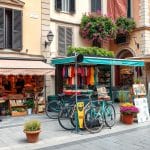Many UK residents dream of buying property in Italy. Italy is loved for its culture, beauty, and food. It’s appealing that over 70% of Italians own their homes. The property market in Italy is stable, with prices rising by 1.1% in the year to February 2021.
- Can Foreigners Buy Property in Italy?
- Buying Property in Italy after Brexit
- Cost of Properties in Italy
- Popular Places to Buy Property in Italy
- Finding a Property in Italy
- Pitfalls to Avoid when Buying Property in Italy
- Choosing the Right Property in Italy
- Steps to Buying Property as a Foreigner in Italy
- Legal Requirements for Buying Property in Italy
- Financing Your Property Purchase in Italy
- Completion on an Italian Property
- Conclusion
- FAQ
- Source Links
Key Takeaways
- Purchasing property in Italy offers the opportunity to own a piece of the country’s rich culture and history.
- The property market in Italy is currently stable, with house prices increasing by 1.1% in the year to February 2021.
- UK nationals and citizens of other countries with reciprocal agreements with Italy can buy property in Italy with generally no restrictions.
- It is important for UK citizens to understand and comply with the new regulations for buying property in Italy after Brexit.
- The price of properties in Italy varies greatly depending on the location and property type.
- Popular places to buy property in Italy include the Costa Smeralda in Sardinia, the Italian Lakes in Lombardy, and Tuscany.
- Using an agent or lawyer when looking for property in Italy is recommended, as well as utilizing property websites and portals.
Can Foreigners Buy Property in Italy?
UK nationals and others from countries with deals can freely buy in Italy. There’s usually no ban on this. However, just owning a home won’t make you a citizen or resident there.
Foreigners should look into visas and how to become a resident properly.
Buying Property in Italy after Brexit
If you’re from the UK and lived in Italy before January 1, 2021, things might not change too much. You might not need a special permit to buy a home in Italy. However, things have changed a bit after Brexit, and it’s good to be up to date.
UK citizens will need to show paperwork to confirm their rights under the UK’s Withdrawal Agreement. This could mean getting an EU residency certificate. It’s important that UK citizens understand and follow these new rules. Doing so will make buying property in Italy easier.
Getting informed about these changes and having the right documents is crucial. It helps UK citizens keep their Italian property dreams alive even after Brexit.
Cost of Properties in Italy
Property prices in Italy vary a lot, depending on where and what you want to buy. You might want a quaint apartment in a small town or a grand villa in a big city. There’s something to fit every purse. Here’s a look at some typical prices in various places in Italy:
Venice
Venice is known for its canals and beautiful buildings. It has higher property prices than other parts of Italy. You might pay between £4,000 to £12,000 for a square metre, based on location and property condition. Places with canal views or in tourist hotspots will cost more.
Milan
Milan is an economic hub with a busy property market. Prices are often above the country’s average, between £3,500 to £8,000 for a square metre. You can find everything from city center flats to outer-suburb villas there.
Rome
Known as the eternal city, Rome has a diverse property market. On average, prices range from £2,500 to £6,000 for a square metre. Properties in the historical center are typically pricier. But, the outskirts and nearby areas have more budget-friendly choices.
Sicily
Sicily is a good place to look for more affordable homes. In cities like Palermo, Catania, or Taormina, prices range from £1,500 to £4,000 for a square metre. Sicily is not just cheap, it has beautiful scenery and a rich culture too.
If your budget’s tight, Sicily’s a great option. It has lovely properties at lower prices than big cities.
Certain areas in Italy offer properties for a symbolic price of 1 euro. These homes are usually in old villages. The goal is to breathe new life into these places by attracting new folks. But, these properties often need a lot of work, so you must remember renovation costs.
Remember, there are many factors that affect a property’s price in Italy. This includes where it is, how big and its shape, and what extras it offers. It’s recommended to get help from a trusted local real estate agent. They can give advice and help you find what you’re looking for within your budget.
Popular Places to Buy Property in Italy
Italy has many great places for property buyers. You can find stunning coastlines, beautiful countryside, and lively cities, matching every taste and budget.
The Costa Smeralda, Sardinia
The Costa Smeralda is famous for its clear waters and lovely beaches. It’s a top pick for those looking for luxury. Here, you can invest in gorgeous coastal views and live a high-end life.
The Italian Lakes, Lombardy
Dreaming of living near a quiet lake with mountain views? Lombardy’s Italian Lakes are a perfect fit. Lake Como, Lake Garda, and Lake Maggiore impress with their beauty. They have lovely towns and lots to do outdoors.
Tuscany, Umbria, and Abruzzo
Love the idea of living in the countryside? Tuscany, Umbria, and Abruzzo are great picks. They’re filled with gentle hills, charming vineyards, and old towns. Perfect for a peaceful life.
Catania, Sicily
For those on a budget, Catania in Sicily is a gem. It blends farmhouses with coastal living. It’s vibrant and offers a more laid-back Italian experience.
Comparison of Popular Places to Buy Property in Italy
| Location | Highlights | Property Prices |
|---|---|---|
| The Costa Smeralda, Sardinia | Stunning coastlines, luxury amenities | Higher budget |
| The Italian Lakes, Lombardy | Beautiful lakes, outdoor activities | Moderate to higher budget |
| Tuscany, Umbria, and Abruzzo | Rustic countryside, vineyards | Varies, but generally moderate |
| Catania, Sicily | Affordable, farmhouse properties, coastal homes | Lower to moderate budget |
It’s key to find the right spot in Italy for your lifestyle. Whether luxury by the coast, country charm, or city buzz, Italy has the dream spot for everyone.
Finding a Property in Italy
If you’re thinking of buying a property in Italy, consider using a well-known property agency. These firms know the local area well and can help you find your ideal property. It’s wise to work with an agent who connects with Italian estate agents. This ensures clear communications and meets your needs.
Italy has numerous property websites that offer many options for buyers. You can check out different kinds of properties and select based on what you like. Here are a few of the best property websites to start your search:
These platforms are great for viewing different properties in Italy. You’ll find everything from beautiful villas to quaint apartments. They list all the important details and can put you in touch with the right people for more info or to set up a viewing.
A Comparison of Property Agencies in Italy and Property Websites in Italy
| Property Agencies in Italy | Property Websites in Italy |
|---|---|
| Expertise and local knowledge | Wide selection of properties |
| Personalized assistance and guidance | Detailed property descriptions and photos |
| Connections with local real estate agents | Contact information for property inquiries |
| Ability to filter properties based on preferences | Convenient search and filtering options |
Using both property agencies and websites in Italy can make your search easier. This way, you get access to many listings and professional help in buying. Whether you want an Italian villa or a simple town apartment, these tools can assist in finding what you’re looking for.
Pitfalls to Avoid when Buying Property in Italy
Buying property in Italy means being careful to avoid scams. This is true for any foreign country too. To stay safe, follow these tips when buying property in Italy.
1. Never buy a property unseen
It’s vital to see the property for yourself before buying it. Don’t just trust the online details or photos. Visit the property, walk around, and check everything. This ensures the place meets your expectations without surprises.
2. Verify the seller’s legal rights
Make sure the seller can legally sell the property. Ask for documents like title deeds to prove their ownership. A well-known lawyer or real estate agent can check this for you. They will make sure the sale is safe and legal.
3. Meet the seller in person
Seeing the seller in real life is a key part of the process. It helps confirm their identity and build a personal relationship. Meeting up also lets you ask about the property and hear the seller’s thoughts. This connection can avoid scams.
4. Trust your instincts and be cautious
Trusting your gut and being careful is important in any property deal. If something seems too good to be true or strange, investigate. It’s always better to be overly cautious than face problems later.
Sticking to these tips and being alert will keep you safe from scams in Italy. Knowing your facts, doing a deep search, and getting advice are your best weapons. They make your buying experience smooth and successful.
Choosing the Right Property in Italy
Choosing a property in Italy means looking at different types of homes. You can find detached houses and villas in the countryside. Or consider cozy apartments in cities like Rome or Milan. Knowing your options helps you make a choice that fits your lifestyle.
Location is also vital when picking a place in Italy. Each area has its own appeal, whether it’s Tuscany’s scenery, Florence’s culture, or the Amalfi Coast’s beaches. Think about what’s nearby, how you’ll get around, and what you like to do. This will guide you to the right spot for your new home.
Checking a property’s condition is a must. Get a professional to inspect it to find any hidden issues. They’ll look at the plumbing, power, and for signs of asbestos or lead. This ensures your new home is safe and right for you.
Property Types in Italy
| Property Type | Description |
|---|---|
| Detached House | A standalone property offering privacy and space. |
| Villa | A luxurious property, often with extensive grounds and amenities. |
| Apartment | A unit within a larger building, typically located in urban areas. |
| Townhouse | A multi-level property with shared walls, often located in historic town centers. |
| Farmhouse | A property in a rural setting, often with agricultural land. |
Think about property types, where they are, and their condition when you’re buying in Italy. Your choice should match your budget and what you want long-term. This way, you’ll pick a place that makes you happy for many years.
Steps to Buying Property as a Foreigner in Italy
Buying property in Italy as a foreigner is much like doing it elsewhere. The process involves several key steps. Let’s dive into them:
- Obtain a mortgage: If you need a loan, look into mortgage options for buying property in Italy. A mortgage broker can help you figure out how much you can borrow. They can also help you get an Agreement in Principle.
- Engage a realtor: You should find a reliable realtor or agent. They should have experience in helping foreigners buy property in Italy. They will guide you through the market and find properties that match your needs.
- Choose a property: Start by thinking about what you want – location, type of property, amenities, and your budget. Do your homework, and visit properties in person to make sure they’re right for you.
- Draft a sale contract: When you’ve found the property you want, a registered Italian lawyer or notary will write up a sale contract for you. This contract will set out the buying terms and conditions.
- Sign the contract: Make sure to carefully read the sale contract. If needed, get legal advice. If everything looks good, sign it with your lawyer or notary present.
- Pay taxes: You’ll have to pay various taxes linked to buying the property. Your lawyer or notary can tell you what you need to pay.
Average Timeline for Buying Property in Italy
| Step | Duration |
|---|---|
| Obtain a mortgage | Varies depending on individual circumstances |
| Engage a realtor | 1-2 weeks |
| Choose a property | Varies depending on personal preferences and availability |
| Draft a sale contract | 1-2 weeks |
| Sign the contract | Occurs after the sale contract is finalized |
| Pay taxes | Varies depending on tax payment deadlines and processes |
Buying property in Italy usually takes about six months. However, this can change based on your own situation. Working with a skilled team, like a good realtor and lawyer, will help make the buy go smoothly.
Legal Requirements for Buying Property in Italy
Buying property in Italy comes with legal steps buyers should know. Having a notary is a good idea to deal with the paperwork and contracts.
Not speaking Italian fluently? It’s smart to get a translator. They can make sure you grasp all the legal musts and needs.
Engaging a notary is a vital step while buying a house in Italy. They make sure everything is legally good to go. Notaries check documents, prepare contracts, and witness the final deal signing.
Know the fees when you buy property in Italy. You usually pay 1% of the price as a deposit. This can go up to 10-20% after you sign an initial contract.
| Legal Requirements for Buying Property in Italy | Engaging a Notary in Italy |
|---|---|
| Engage a translator if not fluent in Italian | Notary handles the legal documents and contracts |
| Ensure legal compliance throughout the process | Verify documentation and prepare necessary contracts |
| Pay a deposit of 1% of the purchase price | Oversee the signing of the final contract |
| Become aware of the fees and charges |
Understand the taxes and fees of owning Italian property. This includes charges and notary expenses. A legal expert can guide you on these costs.
Follow the legal path when buying in Italy for a safe deal. A notary and professional advice will keep you protected and worry-free.
Financing Your Property Purchase in Italy
Thinking about buying a property in Italy? It’s crucial to look at how you’ll finance it. First, get an Agreement in Principle. This shows how much you can borrow for your home. It’s key for talking to banks and lenders. It helps you find the right mortgage for your budget.
Some sellers might not want a mortgage term in the contract. To avoid issues, talk about how you’ll pay before signing anything. Mortgage experts can guide you, making the process smoother. They know what works best for buying property in Italy.
You might borrow the whole cost of the property. This is done with a mortgage and a Lombard loan. A Lombard loan uses your assets, like savings, as a promise to pay back the loan. It’s a great choice if you don’t fit the usual mortgage rules.
| Financing Options | Key Features |
|---|---|
| Mortgage | – Used mostly for buying homes – Banks and finance companies give this – Needs a first payment and regular pay-backs |
| Lombard Loan | – Lets you borrow against what you own – Can be paired with a mortgage – Needs something valuable, like savings, as safety |
Look at a mix of these ways to pay and talk to people who know about buying in Italy. This helps you pick what’s best for your money. Think about your budget and how you’ll pay back, to avoid future problems with your loan.
Completion on an Italian Property
Finalizing the buy of an Italian property needs some key steps. These are done with a notary, ensuring everything is legal and goes smoothly.
Conducting a Title Search
Firstly, the notary does a deep dive into the property’s title. They check who owns it and if there are any problems, like debts. This step is vital to make sure the buyer gets a property with no hidden issues.
Preparing the Final Contract
After confirming the property’s title is clear, the notary then sets up the final contract. This document covers everything agreed upon in the sale. It includes the price, payment plan, and any extra terms.
Overseeing the Signing
Next, it’s time for the buyer and seller to sign the contract. They do this in a meeting with the notary. This signing makes the sale official and transfers ownership from the seller to the buyer.
Payment and Fees at Completion
At this point, the buyer pays the rest of the property’s price. They also cover other costs, like taxes. The notary takes care of these taxes for the government.
Italic
Italic
Bold
| Payment and Fees | Amount |
|---|---|
| Outstanding Balance | Payment according to agreed terms |
| Stamp Duty | Percentage of property value |
| Notary Fees | Variable amount, based on property value |
| Legal Fees | Variable amount, based on complexity of the transaction |
| Registration Taxes | Variable amount, based on property value |
Conclusion
Buying property in Italy lets you own a part of its rich culture and history. There are legal hoops to jump through, but you can smooth sail with good research and help from professionals. Think about where you want to live, the kind of home you want, and your budget. This way, finding your dream Italian home isn’t too hard for people from the UK.
The journey from looking for your new place to signing all the paperwork is full of steps. You’ll work with a real estate agent, pick a home, and sort out the legal stuff with a contract. Remember, it’s vital to follow all legal steps. This means using a notary and handling any taxes and fees.
Success in buying Italian property is about good planning and being careful. It doesn’t matter if you choose a villa in Tuscany or an apartment by the sea in Sicily. Owning a home in Italy is a special way to connect with its magic and beauty. It can become a truly rewarding part of your life.













